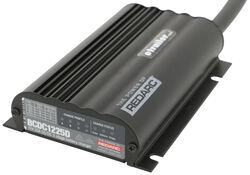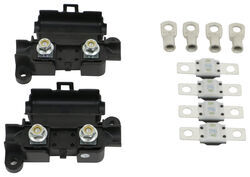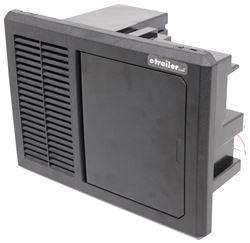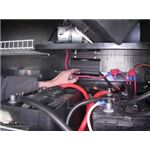
How To Charge An AGM Battery Using The Alternator
Question:
I have the same panel and just Changed out my lead acid house battery to 92 amp hour AGM. I see, from your answer, my panel is ok to charge AGM’s. It’s my understanding because I have a lead acid starting battery, the charging profile of my alternators regulator will only charge at the lead acid batteries rate, which is lower than my new AGM, thus never getting completely charged while driving. Anything to be concerned about? I know I can install a DC to DC charger, but I’m looking for the easiest way to do this without harming the alternator and making my AGM Last. Installing a DC DC charger will require some re-wiring And relocation of components, which I don’t care to do. Would two AGM batteries be better? 1 house, 1 start
asked by: John
Helpful Expert Reply:
The Progressive Dynamics Mighty Mini AC/DC Panel and Converter/Smart Charger # PD4060K is only charging your AGM battery while connected to shore power. Converters like this panel run off of AC current and convert it to DC to recharge the battery.
The only way to charge your battery while on the go would be a DC to DC charger, like you were already looking into, or a solar panel system, with the easiest being the DC to DC Charger. If you're talking about a motorhome then the house battery and start battery would be separated and only the start battery would be getting charged from the alternator.
I recommend installing the Redarc In-Vehicle BCDC Battery Charger - Dual Input - DC to DC - 12V/24V - 25 Amp # 331-BCDC1225D. This charger will charge your house battery with your start battery and won't require you to move components around. You'll have to run some wires between each component with some inline fuses # 331-FK40, but overall it will be an easy installation. I've attached a video below to help you in this process.

Products Referenced in This Question
Redarc In-Vehicle BCDC Battery Charger - Dual Input - DC to DC - 12V/24V - 25 Amp
- Battery Charger
- Battery Charger
- RV/Camper
- Trailer
- 75 Ah
- 200 Ah
- Charges/Maintains
- 12V
- Solar Panels to Auxiliary Battery
- Vehicle Battery to Auxiliary Battery
- Redarc
more information >
40-Amp MIDI Fuse Kit for Redarc In-Vehicle 25-Amp BCDC Battery Charger
- Accessories and Parts
- Battery Charger
- Fuse Kit
- Redarc
more information >
Product Page this Question was Asked From
Progressive Dynamics 4000 Series RV Converter w/ Charge Wizard and AC/DC Distribution Panel - 60 Amp
- RV Converters
- Smart Charge
- Standard Charge
- 10-3/4L x 7-1/4T Inch
- 12V
- 60 Amps
- Lead Acid
- Lithium
- Progressive Dynamics
more information >
Featured Help Information
Instructions
Miscellaneous Media

Continue Researching
- Q&A: 05680-C Master Cylinder Replacement for Trailer Recommendation
- Article: How to Charge a Dump Trailer Battery
- Q&A: Recommended Components for Off-Road Trailer Similar to Chevy Colorado Wheels
- Q&A: Recommended Replacement For A WFCO WF-8750P Power Center
- Q&A: Replacing Parallex 7345 Converter to One that is Compatible with Lithium Batteries
- Article: Brake Controller 7- and 4-Way Installation Kit (ETBC7)
- Article: Trailer Wiring Diagrams
- Article: Brake Controller Installation: Starting from Scratch
- Q&A: Recommended Replacement Grease Seal for 2014 Shorelander Boat Trailer
- Q&A: Trailer Grease Seal to Replace 127194TB
- Q&A: Parts Needed to Install Brake Controller on 2012 Chrysler Town and Country
- Article: Trailer Tester Battery Replacement for Part Number 8010
- Article: Trailer Hitch Receiver Sizes
- Article: Cleaning Your RV Black Water Tank in 4 Easy Steps










